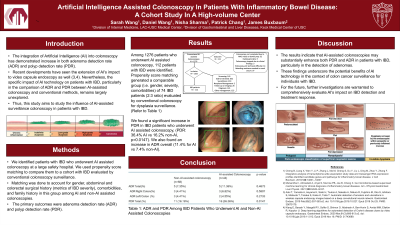Monday Poster Session
Category: IBD
P2638 - Artificial Intelligence-Assisted Colonoscopy Improves PDR in Patients With IBD: A Cohort Study in a High Volume Center
Monday, October 28, 2024
10:30 AM - 4:00 PM ET
Location: Exhibit Hall E

Has Audio

Sarah J. Wang, MD, MPH
University of Southern California
Los Angeles, CA
Presenting Author(s)
Sarah J. Wang, MD, MPH1, Daniel Wang, MD1, Nisha Sharma, MD1, Patrick Chang, MD1, Denis Nguyen, MD2, Justin Ong, MD1, Maziar Amini, MD1, Niwen Kong, MD1, Omar Bakr, MD, MPH2, Dara Bruce, MSc3, Helen Lee, NP2, James Buxbaum, MD2
1University of Southern California, Los Angeles, CA; 2Keck School of Medicine of the University of Southern California, Los Angeles, CA; 3Keck School of Medicine of the University of Southern California, Glendale, CA
Introduction: The integration of Artificial Intelligence (AI) into colonoscopy has demonstrated increase in both adenoma detection rate (ADR) and polyp detection rate (PDR). Prior to the year 2020, AI's influence within the realm of Inflammatory Bowel Disease (IBD) primarily pertained to the subfield of IBD genetics, where it was utilized to identify genes associated with IBD risk (1), and to explore the intricate relationship between IBD and the microbiota, particularly in identifying bacterial taxa with potential screening implications in IBD (2). Recent developments have seen the extension of AI's impact to video capsule endoscopy as well (3, 4). Nevertheless, the specific impact of AI technology on patients with IBD, particularly in the comparison of ADR and PDR between AI-assisted colonoscopy and conventional methods, remains largely unexplored. Thus, this study aims to study the influence of AI-assisted surveillance colonoscopy in IBD patients.
Methods: We identified patients with IBD who underwent AI assisted colonoscopy at a large safety hospital. We used propensity score matching to compare them to a cohort with IBD evaluated by conventional colonoscopy surveillance. Matching was done to account for gender, surgical history (metrics of IBD severity), comorbidities, and family history in this group among AI and non-AI assisted colonoscopies. The primary outcomes were adenoma detection rate (ADR) and polyp detection rate (PDR).
Results: Among 1276 patients who underwent AI assisted colonoscopy, 112 patients with IBD were identified. Propensity score matching generated a comparable group (i.e. gender, severity, comorbidities) of 74 IBD patients (2:3 ratio) evaluated by conventional colonoscopy for dysplasia surveillance. (Refer to Table 1) We found a significant increase in PDR in IBD patients who underwent AI assisted colonoscopy, (PDR: 36.4% AI vs 16.2% non-AI, p=0.0147). We also found an increase in ADR overall (11.4% for AI vs 7.4% non-AI).
Discussion: The results indicate that AI-assisted colonoscopies may substantially enhance both PDR and ADR in patients with IBD, particularly in the detection of adenomas. These findings underscore the potential benefits of AI technology in the context of colon cancer surveillance for individuals with IBD. For the future, further investigations are warranted to comprehensively evaluate AI's impact on IBD detection and treatment response.
Note: The table for this abstract can be viewed in the ePoster Gallery section of the ACG 2024 ePoster Site or in The American Journal of Gastroenterology's abstract supplement issue, both of which will be available starting October 27, 2024.
Disclosures:
Sarah J. Wang, MD, MPH1, Daniel Wang, MD1, Nisha Sharma, MD1, Patrick Chang, MD1, Denis Nguyen, MD2, Justin Ong, MD1, Maziar Amini, MD1, Niwen Kong, MD1, Omar Bakr, MD, MPH2, Dara Bruce, MSc3, Helen Lee, NP2, James Buxbaum, MD2. P2638 - Artificial Intelligence-Assisted Colonoscopy Improves PDR in Patients With IBD: A Cohort Study in a High Volume Center, ACG 2024 Annual Scientific Meeting Abstracts. Philadelphia, PA: American College of Gastroenterology.
1University of Southern California, Los Angeles, CA; 2Keck School of Medicine of the University of Southern California, Los Angeles, CA; 3Keck School of Medicine of the University of Southern California, Glendale, CA
Introduction: The integration of Artificial Intelligence (AI) into colonoscopy has demonstrated increase in both adenoma detection rate (ADR) and polyp detection rate (PDR). Prior to the year 2020, AI's influence within the realm of Inflammatory Bowel Disease (IBD) primarily pertained to the subfield of IBD genetics, where it was utilized to identify genes associated with IBD risk (1), and to explore the intricate relationship between IBD and the microbiota, particularly in identifying bacterial taxa with potential screening implications in IBD (2). Recent developments have seen the extension of AI's impact to video capsule endoscopy as well (3, 4). Nevertheless, the specific impact of AI technology on patients with IBD, particularly in the comparison of ADR and PDR between AI-assisted colonoscopy and conventional methods, remains largely unexplored. Thus, this study aims to study the influence of AI-assisted surveillance colonoscopy in IBD patients.
Methods: We identified patients with IBD who underwent AI assisted colonoscopy at a large safety hospital. We used propensity score matching to compare them to a cohort with IBD evaluated by conventional colonoscopy surveillance. Matching was done to account for gender, surgical history (metrics of IBD severity), comorbidities, and family history in this group among AI and non-AI assisted colonoscopies. The primary outcomes were adenoma detection rate (ADR) and polyp detection rate (PDR).
Results: Among 1276 patients who underwent AI assisted colonoscopy, 112 patients with IBD were identified. Propensity score matching generated a comparable group (i.e. gender, severity, comorbidities) of 74 IBD patients (2:3 ratio) evaluated by conventional colonoscopy for dysplasia surveillance. (Refer to Table 1) We found a significant increase in PDR in IBD patients who underwent AI assisted colonoscopy, (PDR: 36.4% AI vs 16.2% non-AI, p=0.0147). We also found an increase in ADR overall (11.4% for AI vs 7.4% non-AI).
Discussion: The results indicate that AI-assisted colonoscopies may substantially enhance both PDR and ADR in patients with IBD, particularly in the detection of adenomas. These findings underscore the potential benefits of AI technology in the context of colon cancer surveillance for individuals with IBD. For the future, further investigations are warranted to comprehensively evaluate AI's impact on IBD detection and treatment response.
Note: The table for this abstract can be viewed in the ePoster Gallery section of the ACG 2024 ePoster Site or in The American Journal of Gastroenterology's abstract supplement issue, both of which will be available starting October 27, 2024.
Disclosures:
Sarah Wang indicated no relevant financial relationships.
Daniel Wang indicated no relevant financial relationships.
Nisha Sharma indicated no relevant financial relationships.
Patrick Chang indicated no relevant financial relationships.
Denis Nguyen indicated no relevant financial relationships.
Justin Ong indicated no relevant financial relationships.
Maziar Amini indicated no relevant financial relationships.
Niwen Kong indicated no relevant financial relationships.
Omar Bakr indicated no relevant financial relationships.
Dara Bruce indicated no relevant financial relationships.
Helen Lee indicated no relevant financial relationships.
James Buxbaum indicated no relevant financial relationships.
Sarah J. Wang, MD, MPH1, Daniel Wang, MD1, Nisha Sharma, MD1, Patrick Chang, MD1, Denis Nguyen, MD2, Justin Ong, MD1, Maziar Amini, MD1, Niwen Kong, MD1, Omar Bakr, MD, MPH2, Dara Bruce, MSc3, Helen Lee, NP2, James Buxbaum, MD2. P2638 - Artificial Intelligence-Assisted Colonoscopy Improves PDR in Patients With IBD: A Cohort Study in a High Volume Center, ACG 2024 Annual Scientific Meeting Abstracts. Philadelphia, PA: American College of Gastroenterology.
